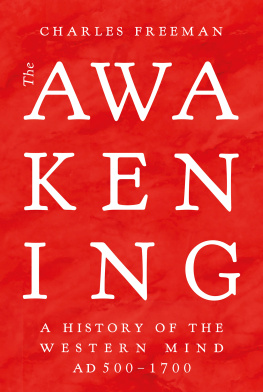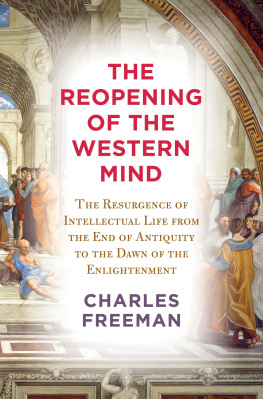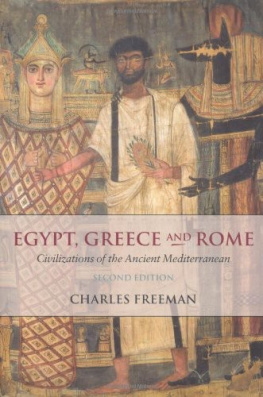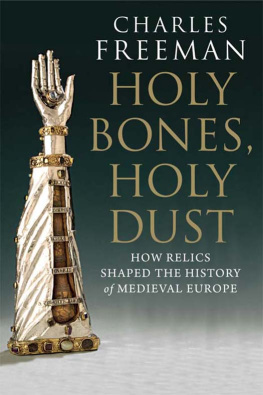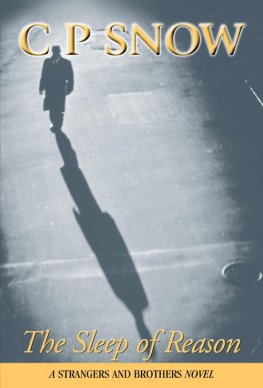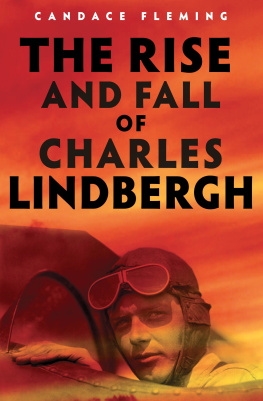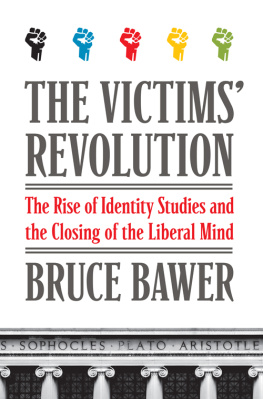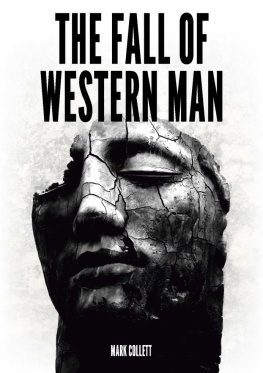Charles Freeman - The Closing of the Western Mind: The Rise of Faith and the Fall of Reason
Here you can read online Charles Freeman - The Closing of the Western Mind: The Rise of Faith and the Fall of Reason full text of the book (entire story) in english for free. Download pdf and epub, get meaning, cover and reviews about this ebook. publisher: Vintage, genre: Religion. Description of the work, (preface) as well as reviews are available. Best literature library LitArk.com created for fans of good reading and offers a wide selection of genres:
Romance novel
Science fiction
Adventure
Detective
Science
History
Home and family
Prose
Art
Politics
Computer
Non-fiction
Religion
Business
Children
Humor
Choose a favorite category and find really read worthwhile books. Enjoy immersion in the world of imagination, feel the emotions of the characters or learn something new for yourself, make an fascinating discovery.

- Book:The Closing of the Western Mind: The Rise of Faith and the Fall of Reason
- Author:
- Publisher:Vintage
- Genre:
- Rating:3 / 5
- Favourites:Add to favourites
- Your mark:
- 60
- 1
- 2
- 3
- 4
- 5
The Closing of the Western Mind: The Rise of Faith and the Fall of Reason: summary, description and annotation
We offer to read an annotation, description, summary or preface (depends on what the author of the book "The Closing of the Western Mind: The Rise of Faith and the Fall of Reason" wrote himself). If you haven't found the necessary information about the book — write in the comments, we will try to find it.
The Closing of the Western Mind: The Rise of Faith and the Fall of Reason — read online for free the complete book (whole text) full work
Below is the text of the book, divided by pages. System saving the place of the last page read, allows you to conveniently read the book "The Closing of the Western Mind: The Rise of Faith and the Fall of Reason" online for free, without having to search again every time where you left off. Put a bookmark, and you can go to the page where you finished reading at any time.
Font size:
Interval:
Bookmark:
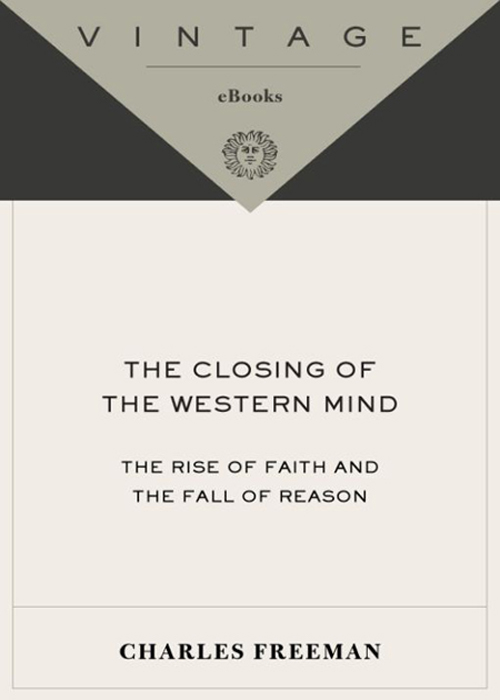

Table of Contents
For Hilary
Blessed is he who learns how to engage in inquiry, with no impulse to harm his countrymen or to pursue wrongful actions, but perceives the order of immortal and ageless nature, how it is structured.
EURIPIDES, FRAGMENT FROM
AN UNNAMED PLAY, FIFTH CENTURY B.C.
There is another form of temptation, even more fraught with danger. This is the disease of curiosity... It is this which drives us to try and discover the secrets of nature, those secrets which are beyond our understanding, which can avail us nothing and which man should not wish to learn.
AUGUSTINE,
LATE FOURTH/EARLY FIFTH CENTURY A.D.
Acclaim for Charles Freemans The Closing of the Western Mind
A fascinating account. The Atlanta Journal-Constitution
Engrossingly readable and very thoughtful.... Freeman draws our attention to myriad small but significant phenomena.... His fine book is both a searching look at the past and a salutary and cautionary reminder for us in our difficult present. The New York Sun
One of the best books to date on the development of Christianity.... Beautifully written and impressively annotated, this is an indispensable read for anyone interested in the roots of Christianity and its implications for our modern worldview.... Essential. Choice
Engaging.... Refreshing.... A memorable account.... The author is always interesting and well informed. Freemans study moves with ease between political and intellectual history.... The cumulative effect is impressive. The Times Literary Supplement
A fine book for a popular audience that enjoys history, clear writing, and subject matter that reflects our own time. Houston Chronicle
The narrative is clear and fluent, the nomenclature is studiously precise... and the theological conflicts of the fourth century are analyzed with... subtlety. History Today
Ambitious, groundbreaking.... In the tradition of... Karen Armstrongs A History of God... a scholarly history that is accessible, passionate and energetic. Hartford Advocate
Freeman has a talent for narrative history and for encapsulating the more arcane disputes of ancient historians and theologians.... He manages not only to make these disputes interesting, but also to show why they mattered so much. It is a coup that few books on the early church pull off. The Independent
Engaging and clearly written. The World and I
[A] lucid account of an intellectual and social transformation that continues to shape the way Christianity is experienced and understood. The Dallas Morning News
Introduction
This book deals with a significant turning point in western cultural and intellectual history, when the tradition of rational thought established by the Greeks was stifled in the fourth and fifth centuries A.D. This closing of the Western mind did not extend to the Arab world, where translated Greek texts continued to inspire advances in astronomy, medicine and science, and so its roots must be found in developments in the Greco-Roman world of late antiquity. This book explores those developments.
Before setting out my argument, it is important to define what is meant by a tradition of rational thought. The Greeks were the first to distinguish, assess and use the distinct branch of intellectual activity we know as reasoning. By the fifth century they had grasped the principle of the deductive proof, which enabled them to make complex and irrefutable mathematical proofs. They also set out the principles of inductive reasoning, the formulation of truths from empirical evidence. Aristotle (384322 B.C.) used this method to make significant advances in our understanding of the natural world. These truths, however, are always provisional. If the sun rises every day of our existence, we might assume that it will always rise, but there is no certainty of this. The Greeks recognized this as well as grasping that theories must always be the servants of facts. Describing what he has observed about the generation of bees, Aristotle notes that the facts have not been sufficiently ascertained, and if they are ever ascertained, then we must trust perception rather than theories. Implicit in this is the thinking of cause and effect. By the fifth century we find the historian Herodotus attempting to relate what he could observe about the Nile floods with their possible causes, and this approach became rooted in the rational tradition. It was the path to a fuller understanding of the natural world and offered the possibility of effective prediction. Yet one should not idealize. In practice it is impossible to disassociate observation from the influences of the wider world. Women were seen by Greek culture to be inferior to men, and empirical observations could all too easily be shaped or interpreted to sustain this, as they certainly were in medicine. The astronomer Ptolemy believed the earth was at the centre of the universe, and all his observations of the planets were interpreted so as not to conflict with this model.
A successful rational tradition needs the support and understanding of the society in which it is based, and in many parts of the Greek world, this is what it received. If truth is to be effectively advanced, any finding must be open to challenge, and this means that even the greatest thinkers must never be made into figures of authority. Aristotles colleague Theophrastus successfully queried instances of what Aristotle claimed was spontaneous generation by noticing tiny seeds Aristotle had missed. If a tradition of rational thought is to make progress, it is essential that it builds in tolerance. No authority can dictate in advance what can or cannot be believed, or there is no possibility of progress. From the philosophical point of view, it is perhaps as important that it accept the limits of what it can achieve, in those areas of knowledge where there are no basic axioms (as there are in a mathematical model, for instance) or empirical evidence from which rational thought can progress. E. R. Dodds, in his famous study The Greeks and the Irrational, notes that honest distinction between what is knowable and what is not appears again and again in fifth-century [B.C.] thought, and is surely one of its chief glories. In short, one cannot pronounce that a statement is true unless it can be supported by logic or empirical evidence. It followed that nothing of certainty could be said, for instance, about the gods. The problem is too complex and life is too short proclaimed the philosopher Protagoras in the fifth century. Despite these words of caution, Dodds work reminds us that irrationality flourished in the Greek world; but perhaps one can put up with 999 irrational minds if the thousandth is an Aristotle or an Archimedes (or a Copernicus or a Newton, or, in inductive logic, a Darwin). It takes only one independent and effective rational mind to change the paradigms of understanding for the rest of humankind.
The conventional wisdom is that Greek science and mathematics petered out in the Hellenistic period (32331 B.C.), but recently scholars have shown greater appreciation of the achievements of such leading figures of the second century A.D. as Galen and Ptolemy. Galens work on logic is being recognized so that, in the accolade of Geoffrey Lloyd, Galen is probably unique among practising physicians in any age and culture for his professionalism also as a logician... conversely he is also remarkable among practising logicians for his ability in, and experience of, medical practice. The ingenuity of Ptolemys astronomical calculations (forced on him as they were by his misconception of the universe!) was extraordinary, but one is reminded, by a recent new translation of his
Next pageFont size:
Interval:
Bookmark:
Similar books «The Closing of the Western Mind: The Rise of Faith and the Fall of Reason»
Look at similar books to The Closing of the Western Mind: The Rise of Faith and the Fall of Reason. We have selected literature similar in name and meaning in the hope of providing readers with more options to find new, interesting, not yet read works.
Discussion, reviews of the book The Closing of the Western Mind: The Rise of Faith and the Fall of Reason and just readers' own opinions. Leave your comments, write what you think about the work, its meaning or the main characters. Specify what exactly you liked and what you didn't like, and why you think so.

